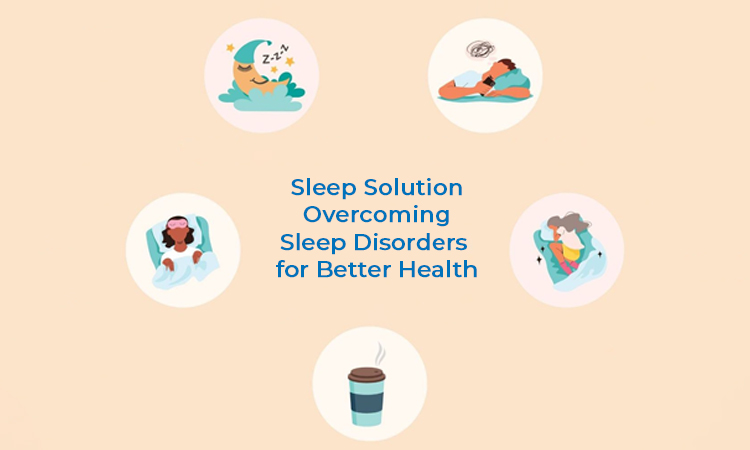
Sleep is essential for individual health, but millions of people suffer through poor sleep, and even though it may not initially cause problems for their daily life, these disorders can lead to long-term health impairments if left unchecked. The right sleep solution is key to improving rest quality, boosting mental clarity, and enhancing physical health. This article will examine the causes of sleep disorders, strategies that can help one overcome them, and ways of achieving better sleep for a healthier life.
Understanding Sleep Disorders and Their Impact
Many other sleep disorders occur that include insomnia, restless leg syndrome, narcolepsy, and obstructive sleep apnea. Such conditions disrupt the rhythm of one’s sleep cycle, thereby making it very difficult to reach deep sleep; deep sleep is crucial for not only physical rejuvenation but also improved cognitive ability. Without rest, bodies do not repair tissues, regulate hormones, and sustain a healthy immune system.
Chronic sleep deprivation can lead to serious health issues, including high blood pressure, heart disease, diabetes, and mental health disorders like anxiety and depression. It can also impair cognitive functions such as memory, concentration, and problem-solving abilities. Therefore, identifying and implementing a sleep essentials for maintaining a balanced and healthy lifestyle.
Common Causes of Sleep Disorders
Some cause sleep disturbances because of lifestyle habits to underlying medical conditions. Major causes include:
High stress level hampers both sleep well and sleep maintenance, thus giving only inadequate rest.
Poor sleep hygiene: Thus, irregular schedules, excessive screen time before going to bed, and an unpleasing environment can all disturb sleep quality.
Diet and Stimulants: Consuming caffeine, alcohol, or heavy meals before the time of sleep may interfere with the body’s natural sleep-wake cycle.
Medical Conditions: Poor quality sleep is associated with chronic pain, respiratory problems, and neurologic disorders.
Medications: Sometimes prescription medications can have negative side effects concerning the sleep pattern.
All these factors need to be addressed to have an appropriate personalized sleep solution.
Effective Sleep Solutions for Overcoming Disorders
There are several ways to end up with sleep disorders and hence poor sleep. The following are some of the ways one can have a good night’s sleep and keep healthy.
- Setting a Sleep Cycle
Sleeping and waking at the same hour every day conditions the internal body clock. This regularity makes the cycle work quite effectively, and the body can easily get into sleep mode and wake up naturally. - A Sleep-Inducing Environment
Deep sleep requires a good and restful sleep environment. Here are a few suggestions for you:
The bedroom should be cool, dark, and quiet.
You may use blackout curtains and white noise machines if required.
Invest in a quality mattress and pillows to maintain proper spinal alignment.
Take all electronic devices away from the bedroom to prevent the exposure of blue light.
- Relaxation Techniques
This implies that reducing stress is important in ensuring quality sleep. Meditating, deep breathing, and progressive muscle relaxation will calm the mind and allow it to prepare the body to go to sleep. These exercises may be an effective solution in an everyday bedtime routine to end insomnia related to anxiety disorders.
- Regular Physical Exercise
Exercise helps one control sleep cycles by reducing psychological stress and ensuring physical tiredness. However, it is not recommended to exercise intensely before sleep since it arouses the brain and makes one have a tough time sleeping.
- Regulating Diet and Hydration
What we consume has a lot to do with the quality of sleep. To sleep naturally consider the following;
Avoiding evening intake of caffeine and nicotine.
Avoiding alcohol because it interferes with REM sleep.
Taking a light dinner at least two hours before sleeping so that one will not be uncomfortable at night due to digestion.
- Professional Sleep Therapy
Sleep therapy can be a wonder for people with major sleep disorders. Professionals can find other causes and recommend treatment appropriately, such as cognitive behavioral therapy for insomnia or continuous positive airway pressure for obstructive sleep apnea. With professional sleep therapy, it is ensured that sleep disorders will be treated correctly.
Benefits of Healthy Sleep
Healthy sleep benefits the body and mind in numerous ways. Good quality sleep can:
Improve one’s cognitive capacity and memory generation.
Enhance one’s immunity system, leading to lesser exposure to diseases.
It can brighten up your mood and psychological status.
Disease chronic status, heart disorders, and diabetic problems can be minimized.
Higher energy levels along with productivity rates.
Conclusion
Finding the right sleep solution is essential to overcome sleep disorders and promote overall well-being. Healthy sleep habits, stress management, and professional sleep therapy when necessary can help individuals achieve better sleep and improve their quality of life. Natural sleep remedies and a structured nighttime routine will ensure long-term success in achieving restorative rest. With dedication and the right strategies, anyone can unlock the key to healthy sleep and experience the profound benefits it offers.